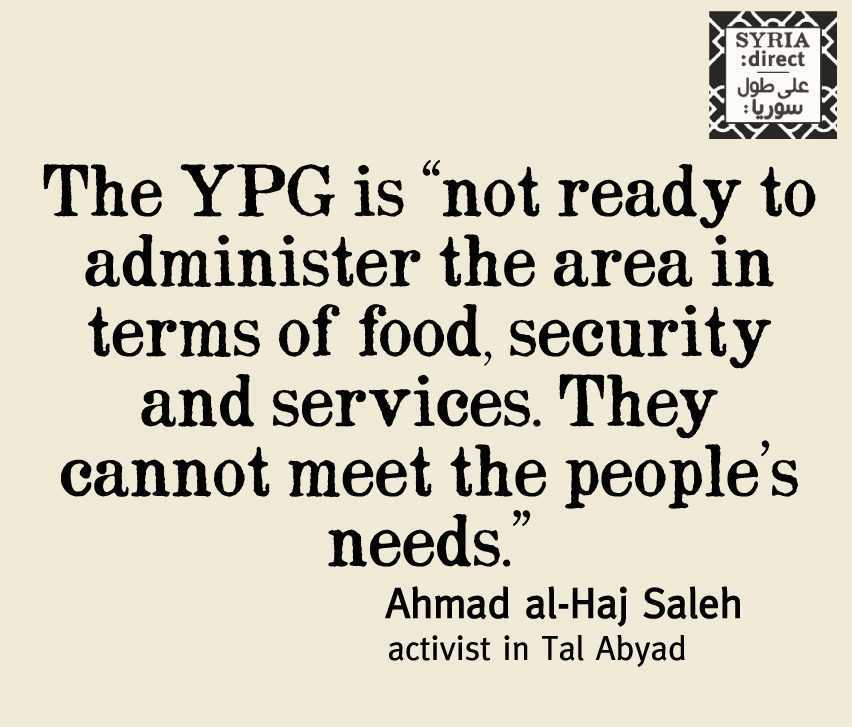Tel Abyad resident: YPG ‘not ready’ to run the city
In the weeks since Kurdish-led forces pushed Islamic State (IS) […]
19 August 2015
In the weeks since Kurdish-led forces pushed Islamic State (IS) fighters out of Tel Abyad, shortages of food and basic goods in the north Al-Raqqa city mean that residents must travel 100km south to A-Raqqa city to secure basic goods and services.
Last week, the Asayish (Kurdish police loyal to the PYD) in Tel Abyad issued an ordinance prohibiting civilian travel between Tel Abyad and A-Raqqa, controlled by the Islamic State, citing an unspecified need “to preserve citizens’ safety and security.”
The ordinance banss the entry of supplies coming from A-Raqqa into Tel Abyad, including construction materials, household items, metal-working materials, tires, fuel and industrial equipment.
“It is a way to put pressure on the people” of Tel Abyad, Ahmad al-Haj Saleh, an activist in Tel Abyad, tells Syria Direct’s Noura al-Hourani of the decision’s impact on residents.
The YPG is “not ready to administer the area in terms of food, security and services,” al-Haj Saleh says, adding that “they cannot meet the people’s needs.”
Q. The issuing of this ordinance seems to indicate the presence of trade between the people of Tel Abyad and IS-controlled A-Raqqa. How is that possible?
A-Raqqa is the local capital, so there are people looking for doctors, buying and selling goods, buying fertilizer and seeds, and servicing their cars and tires along with other day-to-day needs. It is not an exchange of trade in its true meaning.
As for how, these are winding roads and everything happens according to the mood of those at the checkpoints. A-Raqqa is approximately 100 kilometers south of Tel Abyad and the main road usually takes an hour and a half. Because of the checkpoints, it now takes five hours.
Q. What is the state of the people and living situation in general in Tel Abyad?
The living situation in Tel Abyad is very difficult because of the scarcity of food supplies.
The YPG [which now controls Tal Abyad] closed the roads to A-Raqqa, where traders would bring in goods before. Tel Abyad is an agricultural area, and since it is now the vegetable season, this eases the pressure on the people a little since they depend on their agricultural products for food.
There is no electricity, only a minimum amount of water is available, and bread is of poor quality if you can find it.
Today, the YPG raised the price of fuel by 20 percent on the pretext of high production costs.
Q. You said the YPG raised the cost of fuel, are they the only ones who control the oil and why do you consider the price hike a pretext?
The YPG completely controls the oil fields in Al-Hasakah and IS controls the gas and oil in Deir e-Zor and they use it to fund their organizations.
I consider the high cost a pretext because the oil fields are here, they’re free, so what cost are they talking about?
Q. In your opinion, what is the main goal of ordinances such as this?
It is a way to put pressure on the people to displace them and to constrain them.
Q. Why, in your view, would the YPG do that?
I believe it is a future-oriented plan for demographic change.
The other reason, I believe, is that they are not ready to administer the area in terms of food, security, and services. The more the number of residents goes down, the more the problems and pressure on the YPG go down. They cannot meet the people’s needs.







